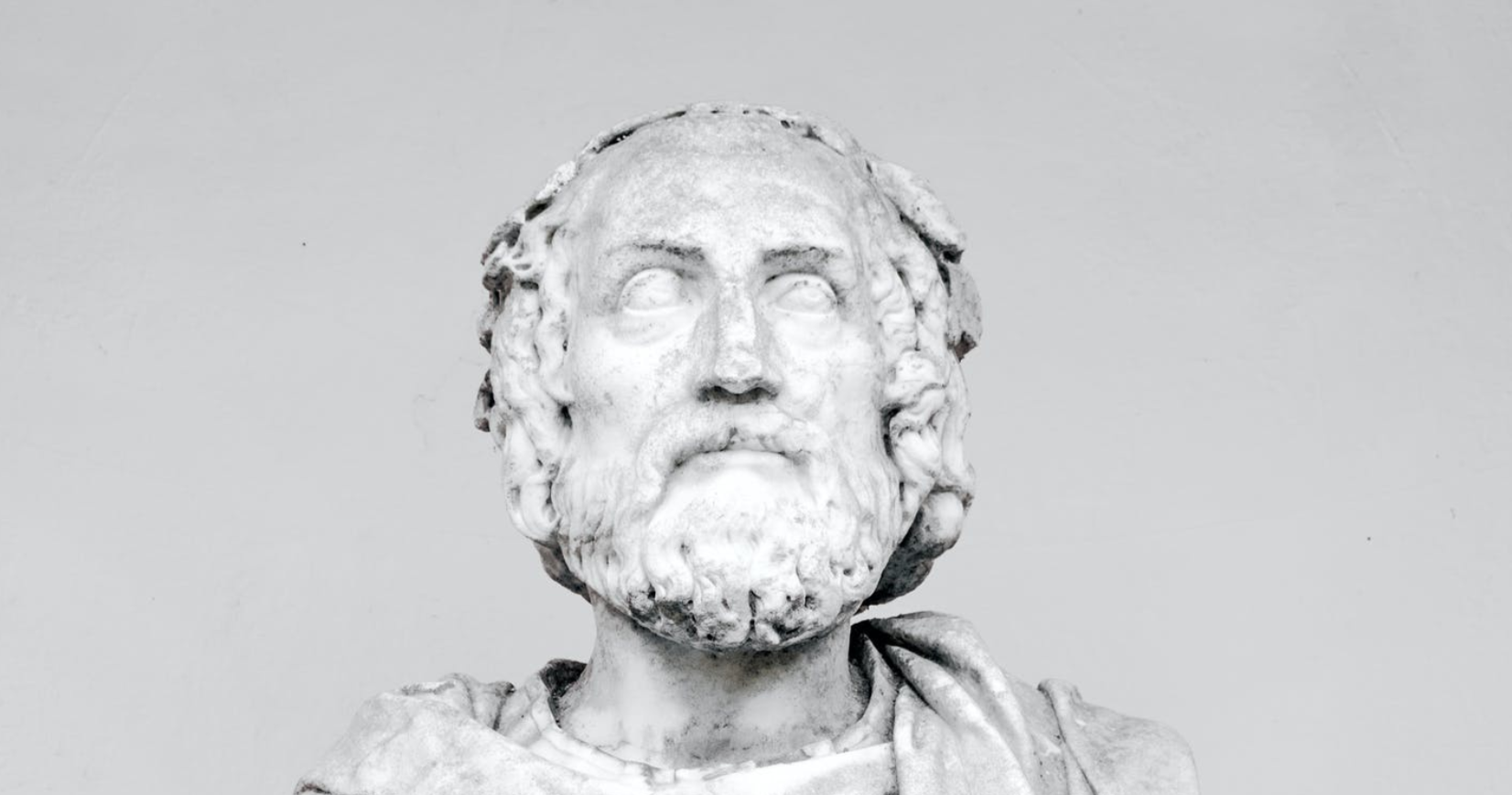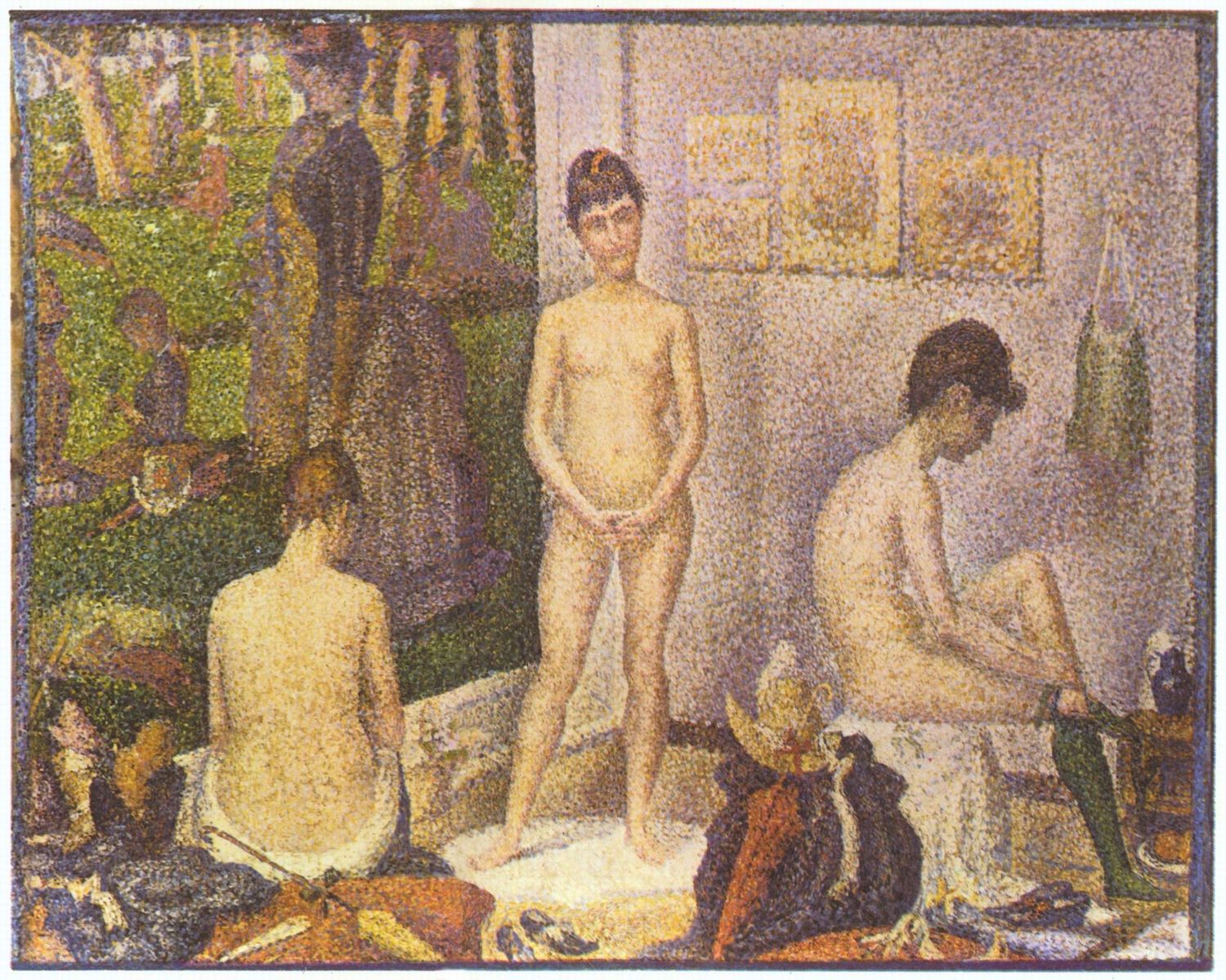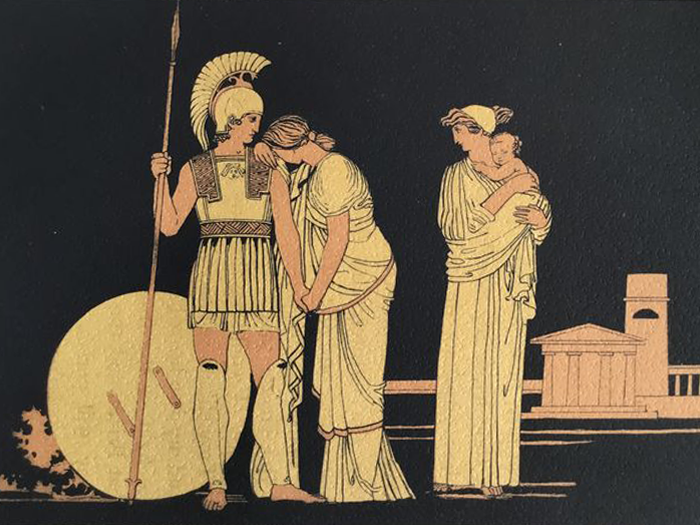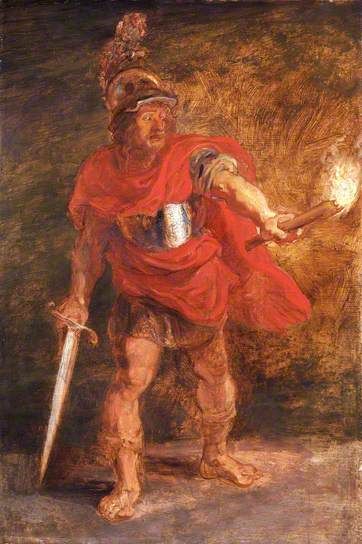There seems to be a prevailing, almost orthodox, interpretation of Plato’s Republic, that Plato himself was a staunch supporter of totalitarianism with great confidence in his proposed aristocracy. But this view often neglects the first city described in Book II, which arises out of the assumption that humans have many needs which cannot be satisfied independently (369b-c). It is easy to dismiss this constitution in particular, for it is quickly pushed aside and forgotten by even the characters themselves. Nonetheless an examination of the text as a whole yields subtle insights, which demand a reconsideration of this city type. In particular, Plato’s method of conversation, the distinction between his own stated convictions and the times when he is simply searching for an unknown answer, and his deconstruction of constitutions in Books VIII and IX, are indications that this first city might after all be his true conception of an ideal state.
Often the first city is written off as a description of how the craftspeople of Plato’s later city might live, or simply an explained genesis of Kallipolis, or still some other interpretation which nicely sets it into the later arguments. Yet it is an entity of its own, outside of Kallipolis, with a unique constitution and disposition. Its citizens are communal autocrats, providing all basic necessities, food, clothing, shelter, for themselves, yet never producing more than they need and never living beyond their means, and only indulging in the bare relishes required for peace and good health, while staying devout to the gods through song (372a-d). Not until Glaucon insists that this is a city only valid for swine does Plato’s Socrates change course, saying he now understands it is the origins of a luxurious city that they are in search of, so that they might “see how justice and injustice grow up in cities,” but not before warning that “the true city, in my view, is the one we have described: the healthy one, as it were” (372e). Henceforth the discussion is on the failures of human nature and the problems they lead to, mainly greed, overconsumption, warfare, and anything else predisposed to cause imbalance and conflict between neighbors.
So, if this is indeed the case, why the digression? If it is Plato’s belief that this simple city is the true city, the good city, the best city, the city that is the purpose of this dialogue, why does he have Socrates go on to examine the luxurious city? Simply to purify it (399e) with strict leaders, restricting laws, and regimented living conditions? No. He does this because it is what Glaucon, his pupil, asks him to do. Glaucon, like Cephalus and Polemarchus in Book I, demands a city that is “conventional” (372d). And because of this, as he did with Thrasymachus, Socrates employs the elenchos, allowing Glaucon to lead the conversation towards his own vision of the ideal city.
Most of the dialogue has Socrates speaking forthright without much interpolation, save where Glaucon or Adeimantus rehash understanding or agreement of a proposal. But multiple instances throughout the dialogue show them stopping Socrates in his speech as well and pushing him in a new direction. The first of these interruptions occurs during the discussion of the first city between Glaucon and Plato previously mentioned. Another occurs in Book V by Glaucon again, who asks Socrates to explain himself further on the sharing of women and children by the guardians. Socrates, before accepting this appeal, replies, “One might, in fact, doubt whether what we proposed is possible, and, even if one granted that it is entirely so, one might still have doubt about whether it would be for the best” (450c). Again Socrates here is hinting that they may be on the wrong path to the ideal city, but, because Glaucon insists, he continues towards the goal. And again, he gives him a warning:
But to produce arguments when one is uncertain and searching, as I am doing, is a frightening thing and makes one feel insecure. I am not afraid of being ridiculed…but I am afraid that if fail to secure the truth, just where it is most important to do so, I will not only fall myself but drag my friends down with as well. (450e-451a)
Nonetheless Glaucon assures him that if they find fault in his arguments, they will indeed stop him. Any truth Socrates might say is only valid therefore if the interlocutors accept it, for despite Socrates’ long monologues, they are the true motivators of the conversation, in complete control of its direction. Socrates only hints to them where they might be going wrong, but unless they consider the hints, nothing is done to prevent the trajectory of the argument.
This is also made clear in Socrates’ own distinction between his personal convictions and where he is simply advocating a contrasting point for the sake of the inquiry. In the former he employs objective statements with words in the first person, such as, “I think” (347c), “I believe” (369b), “in my view” (372e), et cetera. These are the arguments Socrates is certain of which he possesses knowledge in. In the latter his speech is more arbitrary and abstract, and it is directed towards whatever interlocutor he may be questioning at the moment. Examples of the language used in these instances are, “surely…?” (375c), “Do you agree?” (413d), and “I think you would say” (509b). Even when Socrates employs a long monologue explaining something, evidently his own belief, he supplements it with this type of language, thus diminishing any claim that it is indeed truth to him. Only if the interlocutor agrees to it does he continue. It is simply his way of understanding the position of his fellows, who are unwilling to give long explanations themselves, or may not know where exactly they stand on a certain topic.
A long discussion from Books VI-VII also reinforces this claim and helps to further understanding as to its purpose. It begins with Glaucon pressing Socrates to continue his discussion of the good and tell them outright what it is. Socrates however says they must set it aside for the time being, for his beliefs about it are “beyond the range of our present discussion” (506d-e). And this happens, not coincidentally, before his discussion of the sun and line analogies, which inevitably lead to the allegory of the cave in Book VII, culminating at the claim that one must abandon their long held beliefs and allow themselves to be dragged towards knowledge, something they can only attain fully on their own, lest they fall back into belief again. He ends this discussion by calling the journey towards the light, or knowledge, dialect, but not before Glaucon again asks him to explain how it works further. Socrates again refuses to go on, this time saying, “You won’t be able to follow me any farther…though not because of any lack of eagerness on my part. You would no longer see an image of what we are describing, but the truth itself as it seems to me” (532e-533a). The point of the questioning, and allowing Glaucon to lead the conversation, is that Socrates wants him to find truth himself, making only the hints available to him, but never again directly stating what he believes the truth itself to be.
In Book VI, Adeimantus also makes a most curious interpolation, accusing Socrates of sophistic argumentation, that his words are leading the interlocutors astray, for people not trained in asking and answering questions often say when they hear the types of things he argues, particularly those which are hard to contradict, that “at the end of the discussion, a big false step appears that is the opposite of what they said at the outset” (487b). Here Socrates does nothing less than what he does throughout most of the Republic; he asks Adeimantus if he thinks this is true. Adeimenthus cannot come up with an answer, and so he asks Socrates what he thinks, to which he replies, “You would hear that they seem to me to be telling the truth” (487d). Of course, in the context of the discussion, he is responding to Adeimantus’ second part of the speech, which questions the role of rulers in relation to this type of argumentation, and goes on to give the ship of state analogy. But from a literary standpoint, it cannot be dismissed that Adeimantus accuses Socrates himself of this act, and Socrates says that this is truly his intent, responding to all parts of Adeimantus’ speech with a single answer.
Socrates however, if this is taken as true, has no malicious intent in doing so. As is often associated with sophists, he is not arguing for the sake of arguing or for his own benefit. He is instead concerned that the conventions, dogmas, and any other learned beliefs, are damaging to his interlocutors conception of a good constitution and a soul of good quality, the true city and human. The hints used to push Glaucon and Adeimantus to examine education are prime examples of this. Yet they fail to see the truth and inevitably find that lying is useful. He tries over and over again, pushing them towards different educational systems every time, but they never fully understand for themselves. Socrates desperately wants them to come to truth, but they can never seem to attain it. So, in Books VIII-IX, extreme measures are taken in which the aristocracy they have created is deconstructed by Socrates.
On the surface, this portion of the argument is simply an examination of additional city types that may exist. But it is the method by which the examination is carried out that is most intriguing, and offers an alternate explanation of Socrates’ intent. Instead of viewing each on its own, Socrates shows how one evolves into the other. An aristocracy, when musical training is neglected, inevitably becomes a timocracy. Then, physical training will be the next to be neglected, and people will set themselves to moneymaking and acquiring private property, and thus an oligarchy will arise. But because the majority will become indebted and disenfranchised, they will overthrow this constitution and form a democracy. And finally, because so many classes have arisen in the chaos of this last city, they will elect one man as their dictator and give him absolute power, giving way for a tyranny to be born.
It is the tyrant who is the most interesting of all the leaders, for the description of him is identical to that of the just ruler who Thrasymachus defines in Book I. In his absolute power, the tyrant is the strongest of all people in the city, and thus he makes laws which are most advantageous for himself, allowing him to indulge in whatever acts he pleases, while the citizens of his city are disregarded. If the aristocracy Socrates outlines throughout much of the Republic is the greatest city conceivable to Plato, why would he have it decay into the exact type of city he argues against in Book I? And upon further inspection, it is evident that even the aristocracy itself can be argued as a city of this nature. Thrasymachus himself says that any type of rule can follow this guideline for justice (338e), and indeed all of Socrates’ constitutions have the rulers establishing laws which are advantageous to only themselves. The aristocrats have all others in check and practice philosophy incessantly, something that in itself only confers happiness upon them, the timocrats constantly search for honor in warfare, the oligarchs amass wealth, the democrats do as they please, and the tyrant indulges in even the most perverse passions, all without regard for their subjects. Glaucon and Adeimantus, led by Socrates’ hints, have unknowingly carried the conversation to the exact place it began.
But in this deconstruction, Socrates ensures that he hints towards the truth even further, salvaging all useful parts of the conversation thus far. There are instances where Glaucon and Adeimantus, and ultimately the reader, is reminded of the first city, Plato’s good and true city. There is the communal nature of the aristocrats (543a), the fear of incompetent leadership in the timocrats (547d), the satisfaction of only the necessary appetites by the oligarchs (554a), the freedom of the democrats (557b) and their lack of compulsion to rule (557e), and the autocratic nature the tyrant possesses. But the flaws in each of these are exponential to the benefits. The aristocracy cannot please all and so it will inevitably fall, the timocracy is defined by warfare and so it will be unharmonious and breed hostility (547a), the oligarchs are driven by wealth and greed, the democracy is a chaotic anarchy and provides no structure for its inhabitants (560e), and the tyrant “does not refrain from anything, no matter how foolish or shameful” (571d).
Additionally it is important to note Socrates’ comments of democracy further than the rest, for he claims, “it looks, then, as though it is the most beautiful of all constitutions” (557c). It is full of every type of character and everyone lives according to their own constitution, with no compulsion to rule. The problem however lies with its complexity and its natural disposition to assign equality to all even where differences exist (558c). This allows one to live by “gratifying the appetite of the moment” (561c), to do whatever one pleases even if it does not benefit oneself or the city as a whole. Within the democratic city “there is neither order nor necessity” (561d) in life. Yet Socrates says it appears to be the most beautiful constitution, and there must be something to that. How might it be refined and, if it is, will it be similar to the first city?
The idea that there are many types of characters would have to remain, not for the reason that they are all equal, but instead because “none of us is individually self-sufficient” (369b), and each must “contribute his own work for the common use of all” (369e). All have certain abilities and must utilize these for not only self-benefit, but also the collective society’s. The citizens too must not be compelled to rule, for “in a city of good men, if it came into being, the citizens would fight in order not to rule…[because] anyone who is really and truly a ruler does not naturally seek what is advantageous for himself, but what is so for his subject” (347d). There would not be a lack of rulers due to incompetence or laziness, but for the reason that each is entitled to rule oneself as long as others are considered in each action one makes. The first city too calls for a simple order based on the necessities of life, nourishment, hard work, moderation, relaxation (372a-d), and satisfaction of the necessary appetites with “relishes” (372d; 559b). This would diminish the complexity of the city, and ensure that no luxuries are present to pollute the common good.
All this suggests that the first city must be the one Plato has in mind when Glaucon recalls, “you would class both the city you described and the man who is like it as good, even though, as it seems, you had a still finer city and man to tell us about” (543c-d). Here Plato knows that this city would hardly be a possibility, unless all humans who were to live within it came to the conclusion that it indeed was the good city on their own, and this is why he has so adamantly avoided proclaiming that it is the best type, and, for the most part, allowed the interlocutors to lead the conversation. He therefore ends book IX with a reiteration of the three part soul earlier attested to the philosopher kings, with the reason element ruling over the spirited and appetitive parts. A city such as the first would only be possible when all members attain this disposition. As Socrates says, “I myself announce that the son of Ariston has given as his verdict that the best and most just is the most happy, and that he is the one who is most kingly and rules like a king over himself” (580b-c), with the son of Ariston being Glaucon, but also perhaps Plato himself (Reeve, 281). In the end Glaucon and Adeimantus fail to understand Socrates’ direction, for they have indeed been blinded by convention and returned to the cave, but nonetheless Plato sets forth these hints in hope that the reader will see his true intention, the good and just city, only attainable when all humans act justly and allow reason to rule, that he outlines in the first two books of the Republic.
P.S. It doesn't have to end like this
Between Pages is a newsletter for readers like you. Every month I'll send you some notes just like these from my latest read.




